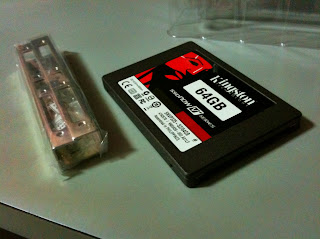SSD Madness
SSD or solid-state drives, basically, a disk drive without any moving parts: no disk platter, no moving seek heads, no motors, etc. Data is stored and access instead through memory cells. In simpler terms, you gain performance compared to traditional HDD. I decided to change to SSD before my HDD kicks the bucket.
The SSD (Kingston 64GB)
I'm installing them in Raid-0 up into a 128GB drive.
The content of the package: SSD, cables, CD with disk cloning software, a casing enclosure 7 a bracket to mount into the system. (The inclusion of the bracket is one of the reason why I brought Kingston. Remember to note that most SSD on the market is in 2.5" form factor, they don't fit into desktop casing without a bracket or your casing comes with a SSD mounting frame)
Why 2x in Raid-0?
Two reasons. First, cost, as the size of SSD gets bigger so does the price and it gets riddiculous expensive from just a small increment in GB. So I could either get a single larger SSD or the same size but split into two drives in Raid configuration. I went with the Raid so that I have the option of just keep adding on the array (i.e. a larger Raid-0 drive but just adding more 64GB individually). Second, SSD traditionally do not have a fast write access compare to the read access, by doing in Raid-0, you can compensate for this although not by much.
Is 128GB enough?
That is how you manage your data, for me, I have offload much of my data into the cloud (see Dropbox) and onto my NAS. So even if my computer crash, I will not be crying over data.
Looking at the disadvantage:
1) Cost
Yes, they are expensive, in Sing dollars terms, a 40GB SSD may cost upwards of $130 upwards depending on the SSD performance specs (size, read/write speed). On the other side the same price can get you a pretty decent 1TB HDD. You have to judge for yourself, for me, the performance is well worth it, applications, games, etc all load superbly fast.
2) They don't last long because I heard of this thing call write levelling
Instead of going into the tech details, we look at the simple specs from the SSD. Assume that the SSD is going to install in you home computer and assuming you are a working adult that is going to spend atleast 3 hrs at home with his computer on a weekday with 20hrs on the weekend. That adds up to (3x5) + 20=35hrs per week. This adds up around 8400hrs for a typical use of a computer that last for around 5 years. Look at the estimated life expancty of the SSD, some of which rates for 1 million hours. Other than the occasional unlucky fellow who gets a defective SSD off the production line, the chances of the SSD failing before you change your computer again is remote.
Of course, the SSD life expectancy drops according to usage patterns and machine type, since I am looking at this from a home computer where the user don't typically spends most of his/her waking hour at, then the SSD life expectancy/write-leveling issue does not really become a factor.
The SSD is well worth it for the performance, with no moving parts, the system runs quieter and consumes less energy, although little on the expensive side, costs are expected to come down, heck they already came down alot when these drives started appearing so I expect them to go down further in the future.
Sunday, December 19, 2010
Subscribe to:
Comments (Atom)


